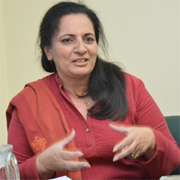 |
 |
 |
 |
 |
 |
Round Table Discussion on
Indian Aggression in Occupied Kashmir -
A Challenge for International Human Right System
Organized by
MUSLIM Institute |
|
Research Think Tank MUSLIM Institute organized a Round table discussion on “Indian Aggression in Occupied Kashmir: A Challenge for International Human Right System” in Islamabad on 26th October 2013. This discussion was organized with reference to the Black day observed in Kashmir on 27th October.
Dr. Muhmmad Khan, Head of International Relations Department, NDU, & Former Ambassador Ashraf Jehangir Qazi were the speakers of the round table discussion. Representatives from different think tanks and foreign diplomats also participated in the discussion.
|
|
|
Tahir Mehmood
Research Associate, MUSLIM Institute
Tahir Mehmood, Research Associate of MUSLIM Institute, introducing the topic, said that on 27th October 1947, India invaded Jammu and Kashmir while trampling over the principles of the partition of British India and in disregard of aspirations of people of Kashmir. When Pakistan responded militarily against the Indian aggression, on December 31, 1947, India made an appeal to the UN Security Council to intervene and a ceasefire ultimately came into effect on January 01, 1949, following UN resolutions calling for a plebiscite in Kashmir. Notably, the Security Council adopted resolution 47 (1948) of 21 April 1948 which promised a plebiscite under UN auspices to enable the people of Jammu and Kashmir to determine whether they wish to join Pakistan or India. On February 5, 1964, India backed out of its promise of holding plebiscite. Instead, in March 1965, the Indian Parliament passed a bill, declaring Kashmir an integral part of the Indian union.
|
|
Dr. Muhammad Khan
Head of International Relations Department, National Defense University, Islamabad
Dr. Muhammad Khan (Head of International Relations Department, National Defense University, Islamabad) while giving a presentation on the topic, said that the very tragedy of Kashmiris had started after 1947 when they were denied their genuine right of self-determination. Various forms of state terrorism have been part of a deliberate campaign by the Indian army against Muslim Kashmiris, especially since 1989. It has been manifested in brutal tactics such as crackdowns, curfews, illegal detentions, massacre, targeted killings, sieges, arson, torture, disappearances, unnamed graves, rape, molestation of Muslim women and killing of persons through fake encounters. According to a report on human rights violations in Indian Occupied Kashmir by Indian Army and its paramilitary forces, there have been deaths of 93,964 innocent Kashmiri since 1989 to September 30, 2013. Besides this alarming figure of open killings, there have been 7,014 custodial killings, 122,090 arrests, destruction and razing of 105,982 houses. The brutal Indian security forces have orphaned over 107, 466 children, widowed 22,776 women and gang raped 10,077 women. Over violence in Indian Occupied Kashmir, Human Rights Watch has documented several failures to ensure protection of human rights. It has called for the repeal of those laws which provide the armed forces with extraordinary powers to search, detain, and use lethal force, leading to numerous human rights violations. They also provide immunity for security forces—their prosecutions, even where the facts are well established, are rare. Amnesty International has pointed out grave human rights violations in the Indian occupied Kashmir by indicating large scale incidents of custodial killings, enforced disappearances, rapes, and arbitrary laws leading to total denial of rights like Jammu and Kashmir Disturbed Areas Act, and the Armed Forces (Jammu and Kashmir) Special Powers Act and Public Safety Act, security forces personnel have extraordinary powers to shoot suspected lawbreakers, and to destroy structures suspected of harboring militants or arms.
|
|
Mr. Ashraf Jehangir Qazi
Former Ambassador
Former Ambassador Ashraf Jehangir Qazi, expressing his views, referred to famous American linguist & philosopher Noam Chomsky who when asked about Kashmir said, “If someone who don’t want to become a part of club or a country then you don’t force them. You must persuade them by treating well and respecting their rights. If they still do not want to join you, you have to give them their right”.
While explaining the facts through History he said that under the Indian Independence Act (IIA) passed by British Parliament, Kashmir was free to join Pakistan or India through plebiscite not by decision of Maharaja and aspiration of the Muslim majority were ignored in blatant violation of the agreement. Following resistance to Indian attempts to forcibly annex Kashmir, India took the matter to UNO where resolutions guaranteeing right of self-determination for people of Kashmir were adopted. However, the Indian rulers always knew that Kashmiris would vote in favor of Pakistan as Sheikh Abdullah, who was regarded as Kashmir’s Gandhi, himself told Nehru, “I don’t want to mislead you and I can’t deliver you Kashmir, if there is a plebiscite we will lose, even though I am the most popular Kashmiri leader but I can’t deliver Kashmir to you”.
Meantime after fraudulent elections in Kashmir, fraudulent decision by the fraudulent assembly representing the people of Kashmir, in which 80% of the members were not elected but the nominated, decided to join India and there were no plebiscite. When India said that there was no need for plebiscite anymore as people had decided through assembly, United Nations in Security Council in 1956 passed a resolution refusing to recognize the accession of Kashmir to India.
 Human rights question in Kashmir is rooted in the Kashmir dispute and Kashmir dispute itself is not a normal dispute like other disputes exist between countries. It is not primarily a territorial dispute as has been wrongly portrayed that both India & Pakistan lay claim on territory of Kashmir. Pakistan only supports the rights of Kashmiri people, the rights which are recognized by the UN resolutions. Those rights have not been implemented so our case is that those should be implemented. Due to denial of political rights of the Kashmiris and the insistence of Kashmiris for the exercise of those political rights their human rights are being violated on a massive scale. If there is political settlement of Kashmir tomorrow; the human rights problems will be resolved. If there is no resolution of Kashmiri problem; there will be no solution to human rights problems in Kashmir.
Human rights question in Kashmir is rooted in the Kashmir dispute and Kashmir dispute itself is not a normal dispute like other disputes exist between countries. It is not primarily a territorial dispute as has been wrongly portrayed that both India & Pakistan lay claim on territory of Kashmir. Pakistan only supports the rights of Kashmiri people, the rights which are recognized by the UN resolutions. Those rights have not been implemented so our case is that those should be implemented. Due to denial of political rights of the Kashmiris and the insistence of Kashmiris for the exercise of those political rights their human rights are being violated on a massive scale. If there is political settlement of Kashmir tomorrow; the human rights problems will be resolved. If there is no resolution of Kashmiri problem; there will be no solution to human rights problems in Kashmir.
If UN resolutions on Kashmir are set aside, it will have twofold implications. One Pakistan will be no longer a party to this dispute, as it is recognized till this day. The other consequence is that accession of Kashmir to India could not be challenged as it was done by so called assembly of Kashmir and Maharaja. In fact, UN resolutions have recognized the same as illegal. As far as Line of Control is concerned, it is temporary line where the fighting/war was stopped.
At present, Indian military and paramilitary troops are using all inhuman techniques of ethnic cleansing to disturb the majority population of the Kashmiris, which had been practiced by the Serb forces on Bosnian and Kosovo Muslims. Notably, Indian forces have intermittently been employing various patterns of state terrorism to maintain their alien rule on this occupied territory but it seems that non-condemnation of these acts by the so-called civilized international community has further encouraged New Delhi to continue its brutalities on the innocent Kashmiri masses. This international silence on human rights abuses by the occupied forces needs to be broken through widespread condemnation of Indian aggression.

|
|
|

 The Round Table Discussion was attended by academicians, researchers, analysts, representative of think-tanks and foreign diplomats.
The Round Table Discussion was attended by academicians, researchers, analysts, representative of think-tanks and foreign diplomats.
|
|
Recommendations |
|
After the speeches, participants had Questions-Answers session. The round table discussion concluded with the following recommendations:-
The Kashmir issue should be analyzed from all angles and we should prepare a convincing case to present before the world.
Negotiation is the way forward but for the negotiations, we should put our house in order and also make strong diplomatic efforts so that the world listens to us.
We should not make any compromise on our principled stance while discussing & negotiating with India on Kashmir.
Kashmir issue should be kept alive and United Nations should be kept informed about its unfulfilled resolutions on Kashmir.
International Human Rights organizations should be urged to take notice of Human Rights violations in Kashmir.
|
|
|
 |
 |
 |
 |
 |
 |
|
|